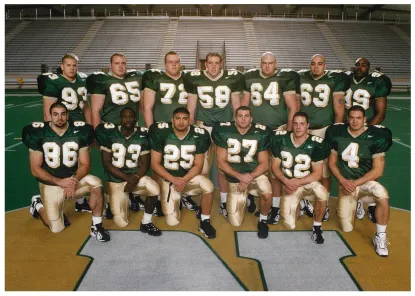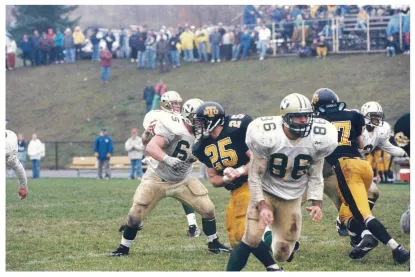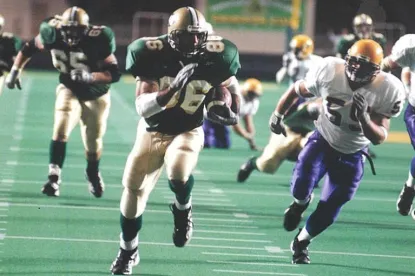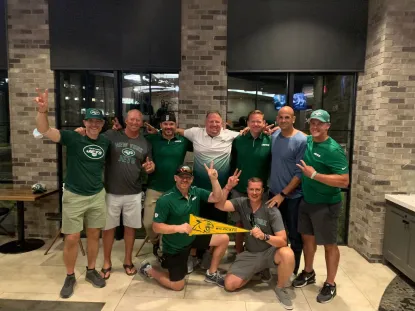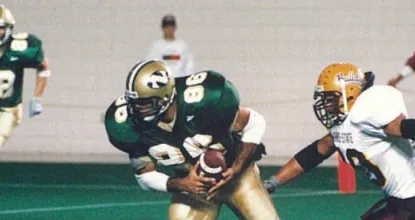
How Robert Saleh’s personal response to a national tragedy changed the game plan for his career.
Former Wildcat football player Robert Saleh was hired by the New York Jets for his first NFL head coaching job early this year, making history as the first Muslim American to achieve that rank. It is significant that Saleh reached the pinnacle of his profession near the epicenter of the 9/11 terrorist attacks. His journey to the NFL essentially began with that tragedy 20 years ago, after his older brother narrowly escaped the South Tower of the World Trade Center.
Saleh was rattled by the incident and became profoundly introspective about life’s fragility and his own sense of purpose. That following February—one day after Super Bowl 36—he sobbed uncontrollably during a phone call to his brother, confiding that he could no longer work as a financial credit analyst in Detroit. He said he felt compelled to recalibrate his career and pursue his dream of coaching in the NFL.
“I think 9/11 impacted everyone somehow, some way,” Saleh told the media during his introductory press conference. “Going through the tragedy my brother experienced and being able to self-reflect on what I was doing at that moment and realizing that I had a passion for football really triggered this whole thing. In 2014, I was here in MetLife Stadium coaching with Seattle and we won the Super Bowl. And now to be here as part of the New York Jets, knowing that our first game is a day after the 20th anniversary ... I’m supposed to be here, and I believe that.”
“Robert has shown through his journey here that he is a leader; one who will engage the entire team,” said Jets Vice Chair Christopher Johnson. “He has consistently demonstrated the ability to innovate, motivate and collaborate. His character and passion are what this team needs.”
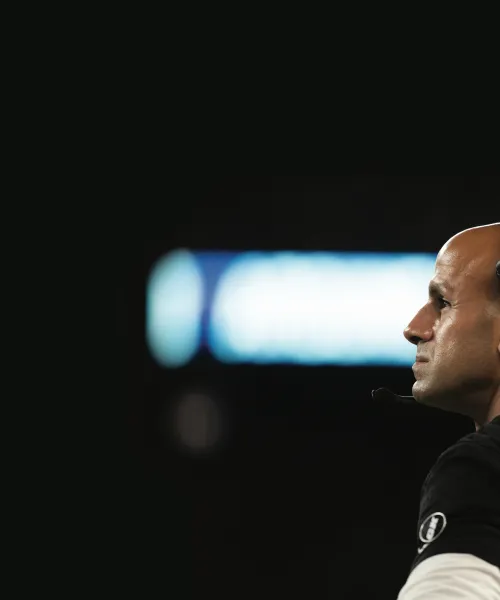
Saleh ’01 BS became a serious contender for various NFL head coaching vacancies that surfaced after last season. His former Wildcat head coach Eric Holm, whom he had reconnected with about a month earlier, had been keeping up with the rumors and tracking NFL interviews. In a JetsWire story, Holm said he was shocked to receive an immediate response to a congratulatory text he sent to Saleh on the evening the Jets announced their selection.
“I texted him congratulations and good luck and all that and I got a text back from him a minute later,” Holm said. “Honestly, I was moved by that. New York City, the center of the universe, and one of the plum jobs in the NFL, the New York Jets. I can’t imagine all the things he’s got going from all different directions, and yet he took the time to text me back a quick thanks. For an old coach like me, that was meaningful, and it tells you that’s just the kind of person he is.”
Saleh was a four-season starter at tight end for the Wildcats from 1997- 2000. Some of his NMU teammates have remained friends over the years. In fact, seven of them traveled to watch him on the sideline in the team’s home opener against the New England Patriots. The Jets lost that game after two wins and a tie in a promising preseason, but former NMU linebacker Matt Tuccini ’00 BS of Marquette said it was highly memorable to see Saleh coach in person for the first time.
“We were up in a suite and when the team came out on the field and we saw our buddy leading the way for an entire NFL organization, it was like, ‘Wow, that’s crazy!’ We got to spend some time with him outside the game, too, which was nice. It’s still surreal to see him as a head coach in the NFL, but it’s not really a surprise. Ever since he decided to go into coaching, it seems he’s constantly driven to put in the highest effort possible to achieve his goals, whether it’s on the field, with his family, fitness, golf or anything else.
“We were a tight-knit group as teammates and that has continued over the years. As he started climbing the ranks, we would joke with him, ‘Why are you still hanging out with us; don’t you have cooler friends now?’ Seriously, though, it’s been fun to see him grow and we’re really proud of him. But he’s still the same guy.”
Tuccini said three of Saleh’s uncles played on Northern’s 1975 national championship team: Mike Berry ’78 BS, Alex Misalmante and Joe “Doc” Saleh ’78 BS. Robert’s father, Sam, starred at Fordson High in Dearborn, where Robert was raised, and played at Eastern Michigan before his pro career was cut short by a major knee injury in his first training camp with the Chicago Bears.
“When we played away games at Wayne State, his parents took the entire team to dinner on two different occasions,” Tuccini added. “We had Arabic food that was really, really good. His parents were big supporters and did those kinds of things for us.”
Dearborn has the largest and most diverse Arab population of any U.S. city. Saleh’s selection as the first Muslim head coach in the NFL is a source of pride for his Lebanese American family and his hometown.
“I wasn’t even aware of it, but it’s been a very humbling experience,” Saleh said. “When you look at an NFL organization and you look at the locker room, it’s like the ultimate melting pot of different people and different races and different stories that get together with one goal. To be a part of that is special.”
During the Jets introductory press conference, Saleh was quick to reference his “All Gas, No Brake” mantra. He said the phrase had guided his approach to coaching and would permeate the team’s culture moving forward.
“We’re not talking about effort on the football field,” Saleh told the media. “We’re talking about the process by which we do things: the way we prepare; the way we rehab; how we take the practice field; the way we communicate. I cannot tell you enough how excited I am to work with this entire Jets organization on understanding that, from the top down, we will all wake up in the morning and step on the pedal and do everything we can to get a little better each and every day. That’s what we’re going to represent, and I’m confident that mindset will lead to championships.”
As his former Wildcat teammates discovered during their September visit, the “All Gas, No Brake” mantra is now displayed prominently in large green font on a wall at Jets headquarters in Florham Park, New Jersey. About four years earlier, Saleh had generated applause from San Francisco 49ers fans at a State of the Franchise event, when he used the same phrase in a different context to describe the “attack-the-ball” style of punishing defense he planned to implement as the team’s new defensive coordinator.
He delivered on that promise, helping to transform a unit that sat near the bottom of the league when he arrived into a Top 5 performer his last two seasons. On its journey to the 2020 Super Bowl against eventual champion Kansas City, San Francisco ranked No. 1 in the league against the pass and No. 2 in total defense. The respect he earned from the 49ers organization was evident in the congratulatory tweets posted by several players and executives.
“Robert’s earned this opportunity,” wrote 49ers General Manager John Lynch. “He’s smart, a tremendously gifted leader and ready for this challenge. We’ll miss him dearly but he’s left us better and we’ll be proud of all that he’ll accomplish. The Jets are very fortunate.”
Saleh had made similar improvements on defense during his previous NFL stops with the Jacksonville Jaguars, Seattle Seahawks and Houston Texans. Before entering the pro coaching ranks, he extended his Michigan roots with two seasons as an assistant coach at Michigan State and one at Central Michigan. He made a brief stop at the University of Georgia before heading to Houston. One could argue that “All Gas, No Brake” also applies to his career ascent.
Saleh talked about the coaches who had the greatest influence on him along the way. They include former MSU head coaches Bobby Williams, who gave him his first shot at coaching, and John L. Smith, who moved him to the defensive side of the ball. He said Seattle Seahawks Head Coach Pete Carroll encouraged Saleh and other young assistants to create their own identities.
“He said it’s easy to try to emulate what other people are, but identify yourself and be who you are first, because when adversity hits, your authenticity will shine.”
Saleh developed a signature style that has been described as passionate, fiery and intense. He gained a reputation for effectively connecting with players and motivating them to perform at a higher level than they believed possible.
“Players really want two things from a coach,” he said. “One, they want to know you care about their well-being. Everyone says it’s a business; I get it, but it’s not. It’s a personal investment in people. The most important people are the ones who strap up on game day and step between the lines. And obviously, can you help them make plays on Sunday so they can get paid as much as possible. You’ve got to give them everything you can. When you do, the reciprocation happens, and when it does, it becomes personal. That’s all you can ask for, to get to a point where everyone has each other’s back and feels accountable to one another.”
Rookie seasons can be challenging. At press time, the Jets were 1-4 in the AFC East. But it takes some time to implement a new system and turn around a franchise that hasn’t had a winning season since 2015. If anyone is up to that challenge, it’s Saleh.
by Kristi Evans
Photo of Saleh in black shirt by Dustin Satloff / Stringer via Getty Images
Note: Northern Magazine attempted to interview Saleh about his NMU experience, but was unable to connect during his inaugural season.
